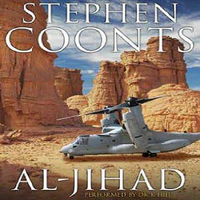Al-Jihad by Stephen Coonts ch 3-1
THREE We were inside a rain cloud. Water ran off the windscreen in continuous streams: The dim glow of the red cockpit lights made the streams look like pale red rivers. Beyond the wet windscreen, however, the night was coal black.
I had never seen such absolute darkness.
Julie Giraud had the Osprey on autopilot; she was bent over fiddling with the terrain-avoidance radar while auto flew the plane.
I sure as hell wasn't going to be much help. I sat there watching her, wondering if I had made a sucker's deal. Three million was a lot of money if you lived to spend it. If you died earning it, it was nowhere near enough.
After a bit she turned off the radios and some other electronic gear, then used the autopilot to drop the nose into a descent. The multifunction displays in front of us—there were four plus a radar screen—displayed engine data, our flight plan, a moving map, and one that appeared to be a tactical display of the locations of the radars that were looking at us. I certainly didn't understand much of it, and Julie Giraud was as loquacious as a store dummy. “We'll drop off their radar screens now,” she muttered finally in way of explanation. As if to emphasize our departure into the outlaw world, she snapped off the plane's exterior lights. As the altimeter unwound I must have looked a little nervous, and I guess I was. I rode two helicopters into the ground in Vietnam and one in Afghanistan, all shot down, so in the years since I had tried to avoid anything with rotors. Jets didn't bother me much, but rotor whop made my skin crawl. Down we went until we were flying through the valleys of the Bavarian Alps below the hilltops. Julie sat there twiddling the autopilot as we flew along, keeping us between the hills with the radar.
She looked cool as a tall beer in July. “How come you aren't a little nervous?” I asked. “This is the easy part,” she replied.
That shut me up.
We were doing about 270 knots, so it took a little while to thread our way across Switzerland and northern Italy to the ocean. Somewhere over Italy we flew out of the rain. I breathed a sigh of relief when we left the valleys behind and dropped to a hundred feet over the ocean. Julie turned the plane for Africa.
“How do you know fighters aren't looking for us in this goop?” I asked. She pointed toward one of the multifunction displays. “That's a threat indicator. We'll see anyone who uses a radar.” After a while I got bored, even at a hundred feet, so I got unstrapped and went aft to check the Humvee, trailer, and cargo. All secure.
I opened my duffel bag, got out a pistol belt. The gun, an old 1911 Colt .45 automatic, was loaded, but I checked it anyway, reholstered it, got the belt arranged around my middle so it rode comfortable with the pistol on my right side and my Ka-Bar knife on the left. I also had another knife in one boot and a hideout pistol in the other, just in case.
I put a magazine in the M-16 but didn't chamber a round. I had disassembled the weapon the night before, cleaned it thoroughly, and oiled it lightly.
The last weapon in the bag was a Model 70 in .308. It was my personal rifle, one I had built up myself years ago. With a synthetic stock, a Canjar adjustable trigger, and a heavy barrel custom-made for me by a Colorado gunsmith, it would put five shots into a half-inch circle at a hundred yards with factory match-grade ammunition. I had the 3x9 adjustable scope zeroed for two hundred. Trigger pull was exactly eighteen ounces.
I repacked the rifles, then sat in the driver's seat of the Humvee and poured myself a cup of coffee from the thermos. We Flew to Europe on different airlines and arrived in Zurich just hours apart. The following day I opened a bank account at a gleaming pile of marble in the heart of the financial district. As I watched, Julie called her banker in Virginia and had $1.5 million in cold hard cash transferred into the account. Three hours after she made the transfer I went to my bank and checked: The money was really there and it was all mine.
Amazing.
We met for dinner at a little hole-in-the-wall restaurant a few blocks off the main drag that I remembered from years before, when I was sight-seeing while on leave during a tour in Germany.
“The money's there,” I told her when we were seated. “I confess, I didn't think it would be.” She got a little huffy. “I'd lie to you?” “It's been known to happen. Though for the life of me, I couldn't see why you would.” She opened her purse, handed me an unsealed envelope. Inside was a passport. I got up and went to the men's room, where I inspected it. It certainly looked like a genuine U.S. passport, on the right paper and printed with dots and displaying my shaved, honest phiz. The name on the thing was Robert Arnold. I put it in my jacket pocket and rejoined her at the table.
She handed me a letter and an addressed envelope.
The letter was to her banker, typed, instructing him to transfer another $1.5 million to my account a week after we were scheduled to hit the Camel. The envelope was addressed to him and even had a Swiss stamp on it. I checked the numbers on my account at the Swiss bank. Everything jibed.

